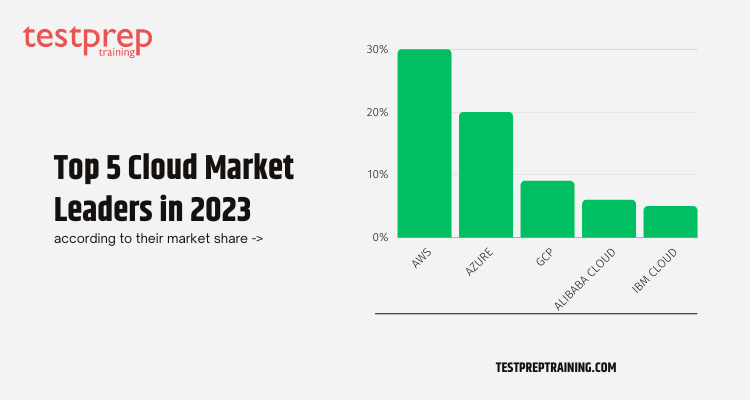The cloud computing market has experienced tremendous growth in recent years, and the competition among cloud service providers is fierce. The top cloud market leaders in 2023 include Amazon Web Services (AWS), Microsoft Azure, Google Cloud Platform (GCP), Alibaba Cloud, and IBM Cloud. These providers offer a wide range of cloud services, including compute, storage, networking, database, and artificial intelligence.
As more and more businesses shift their operations to the cloud, these providers will continue to play a crucial role in driving digital transformation and delivering cutting-edge technologies to their customers.
In this blog, we will discuss the top 5 cloud market leaders in 2023 based on their market share, revenue, and customer satisfaction.
5 Best Cloud Market Leaders in 2023
They have a strong global presence, extensive partner ecosystems, and a focus on continuous innovation. These cloud providers dominate the market due to their scalability, reliability, and cost-effectiveness.

- Amazon Web Services (AWS): AWS is the undisputed leader in the cloud market, with a market share of over 30%. It offers many cloud computing services, including compute, storage, database, analytics, and artificial intelligence. AWS is known for its scalability, reliability, and cost-effectiveness, making it the preferred choice for businesses of all sizes. In 2022, AWS generated a revenue of $70 billion, making it the most profitable business unit of Amazon. AWS continues to dominate the cloud market due to its vast network of global data centers, extensive partner ecosystem, and continuous innovation.
- Microsoft Azure: Microsoft Azure is the second-largest cloud service provider, with a market share of around 20%. It offers comprehensive cloud services, including compute, storage, networking, database, and artificial intelligence. Azure is known for its seamless integration with Microsoft’s existing products, such as Windows Server and Office 365. In 2022, Azure generated a revenue of $44 billion, making it the fastest-growing cloud provider. Azure’s growth is driven by its expanding global presence, hybrid cloud capabilities, and investments in cutting-edge technologies like quantum computing and edge computing.
- Google Cloud Platform (GCP): Google Cloud Platform is the third-largest cloud provider, with a market share of around 9%. It offers many cloud services, including compute, storage, networking, database, and machine learning. GCP is known for its advanced machine learning capabilities, such as natural language processing and image recognition. In 2022, GCP generated a revenue of $17 billion, making it the third-largest cloud provider in terms of revenue. GCP’s growth is driven by its focus on innovation, partnerships with leading companies, and investments in emerging technologies like blockchain and serverless computing.
- Alibaba Cloud: Alibaba Cloud is the fourth-largest cloud provider, with a market share of around 6%. It offers many cloud services, including compute, storage, networking, database, and security. Alibaba Cloud is known for its strong presence in Asia-Pacific and focus on serving small and medium-sized enterprises. In 2022, Alibaba Cloud generated a revenue of $13 billion, making it the largest cloud provider in Asia. Alibaba Cloud’s growth is driven by its expanding global presence, strategic partnerships, and investments in cloud-native technologies like containerization and Kubernetes.
- IBM Cloud: IBM Cloud is the fifth-largest cloud provider, with a market share of around 5%. It offers many cloud services, including compute, storage, networking, database, and artificial intelligence. IBM Cloud is known for its enterprise-grade security and compliance capabilities and its focus on hybrid cloud. In 2022, IBM Cloud generated a revenue of $11 billion, making it one of the oldest and most established cloud providers. IBM Cloud’s growth is driven by its partnerships with leading companies, investments in emerging technologies like quantum computing and edge computing, and its focus on delivering mission-critical workloads.
Let us now look at some of the top features of these leading companies.
Key Features of top Cloud Companies
Here are some of the key features of the top 5 cloud companies in 2023:
- Amazon Web Services (AWS):
- Vast network of global data centers.
- Extensive partner ecosystem.
- Continuous innovation in cloud services and technologies.
- High scalability and reliability.
- Cost-effective pricing models.
- Microsoft Azure:
- Seamless integration with Microsoft’s existing products.
- Expanding global presence.
- Hybrid cloud capabilities.
- Investments in cutting-edge technologies like quantum computing and edge computing.
- Strong focus on security and compliance.
- Google Cloud Platform (GCP):
- Advanced machine learning capabilities.
- Focus on innovation and emerging technologies.
- Partnerships with leading companies.
- Investments in cloud-native technologies like containerization and Kubernetes.
- Global presence and strong focus on sustainability.
- Alibaba Cloud:
- Strong presence in the Asia-Pacific region.
- Focus on serving small and medium-sized enterprises.
- Expanding global presence.
- Strategic partnerships with leading companies.
- Investments in cloud-native technologies like containerization and Kubernetes.
- IBM Cloud:
- Enterprise-grade security and compliance capabilities.
- Focus on hybrid cloud.
- Partnerships with leading companies.
- Investments in emerging technologies like quantum computing and edge computing.
- Strong focus on delivering mission-critical workloads.
These key features enable the top cloud companies to provide a wide range of cloud services and deliver them to businesses of all sizes. These providers continue to invest in new technologies, partnerships, and capabilities to stay ahead of the competition and meet the evolving needs of their customers. Now, we’ll look at some factors you should consider for Choosing Cloud Companies.
How to choose best Cloud Company as per your needs?
Choosing the right cloud company can be a daunting task, especially with so many options available in the market. Here are some tips that can help you make an informed decision:
- Determine your requirements: It’s important to identify your specific needs and requirements before selecting a cloud provider. Consider factors like the type of workload you need to run, the level of security you require, and your budget.
- Evaluate pricing models: Different cloud companies offer different pricing models, and it’s important to evaluate them based on your usage patterns. Look for a provider that offers flexible pricing options, such as pay-as-you-go or subscription-based pricing.
- Assess security and compliance: Security and compliance are critical factors when selecting a cloud provider. Look for providers that offer advanced security features like encryption, access controls, and compliance with relevant regulations.
- Consider support and services: Look for a provider that offers responsive and reliable customer support and a wide range of services and tools to help you manage your cloud environment.
- Evaluate performance and reliability: The performance and reliability of a cloud provider’s infrastructure are crucial to ensuring smooth operations. Look for providers that offer high uptime guarantees, low latency, and high-speed network connections.
- Consider vendor lock-in: Some cloud providers may offer proprietary tools or services that can make it difficult to migrate to another provider in the future. Consider the long-term implications of vendor lock-in before choosing a provider.
- Check for integration capabilities: If you are already using other software or tools, ensuring that the cloud provider you select integrates seamlessly with your existing systems is important.
Following these tips, you can select a cloud company that meets your requirements, offers reliable and secure services, and provides excellent customer support.
Conclusion
In conclusion, AWS, Azure, GCP, Alibaba Cloud, and IBM Cloud will be the top 5 cloud market leaders in 2023. These cloud providers offer a wide range of cloud services, have strong global presence, and are investing in cutting-edge technologies to stay ahead of the competition. Businesses adopting cloud computing can choose any provider based on their specific requirements and preferences.


